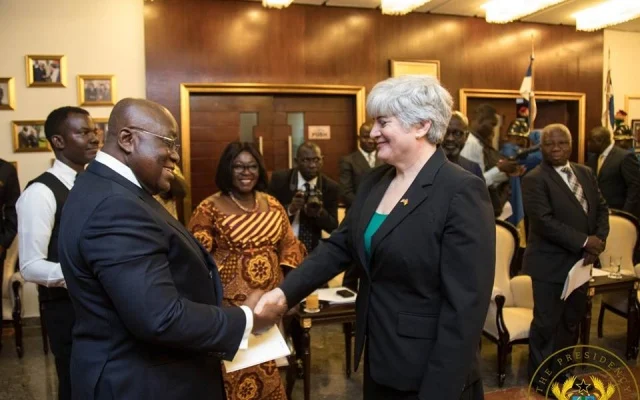Ghana, US take next steps forward on clean, safe nuclear energy
“Clean, reliable, and safe nuclear energy can provide significant benefits to Ghana and the Ghanaian people – including clean energy, agricultural improvements, clean water, advanced medical treatments, and more. The climate crisis is serious and urgent. Next generation nuclear energy, like what we’re working on today, must be part of the solution,”
- Advertisement -
The United States and Ghana jointly launched their partnership under the Foundational Infrastructure for Responsible Use of Small Modular Reactor Technology (FIRST) programme on February 25.
U.S. Ambassador Stephanie S. Sullivan; Ghana’s Senior Advisor to the President Hon. Yaw Osafo Marfo; Minister of Energy Hon. Dr. Matthew Opoku Prempeh; representative of the Minister of Environment, Science, Technology and Innovation Mr. Kwamena Quayson; Director General of the Ghana Atomic Energy Commission Prof. Samuel Boakye Dampare; Director General of the Nuclear Regulatory Authority Dr. Nii Kwashie Allotey; U.S. Deputy Assistant Secretaries Anthony Wier from the Department of State’s Bureau of International Security and Nonproliferation, Aleshia Duncan from the Department of Energy’s Office of Nuclear Energy, and Camille Richardson from the U.S. Department of Commerce’s International Trade Administration; and Japan’s Deputy Commissioner of International Affairs from the Ministry of Economy, Trade, and Industry joined the virtual program to commemorate the partnership and discuss next steps in U.S.-Ghana civil nuclear cooperation.
- Advertisement -
The FIRST programme, led by the U.S. Department of State, will support Ghana’s adoption of small modular reactor (SMR) technology, including support for stakeholder engagement, advanced technical collaboration, and project evaluation and planning. Japan has been a valuable partner with the United States on the FIRST programme and will build on its existing partnership with Ghana to advance Ghana’s civil nuclear power aspirations.
- Advertisement -
“Clean, reliable, and safe nuclear energy can provide significant benefits to Ghana and the Ghanaian people – including clean energy, agricultural improvements, clean water, advanced medical treatments, and more. The climate crisis is serious and urgent. Next generation nuclear energy, like what we’re working on today, must be part of the solution,” noted Ambassador Sullivan during the event.
According to the Minister of Energy Dr. Matthew Opoku Prempeh, Ghana’s decision to include nuclear power in the nation’s energy mix has led the country to establish Nuclear Power Ghana Limited as an Owner Operator and the project developer. This ambitious target for a newcomer country presents avenues like the FIRST Program to further develop the competencies of the Nuclear Power Ghana Limited towards delivering on its mission to build and operate safely Ghana’s first nuclear power plant.
The senior advisor to the president noted, “We hold a strong belief that this collaboration/partnership under FIRST will complement the IAEA’s milestone approach which Ghana has adopted in developing its nuclear programme, as well as upscale the competencies of the people to be able to progress to construct, operate, and regulate the technology in a safe, secured, and safeguarded manner.”
- Advertisement -
“Through these capacity enhancing activities, the Ministry is convinced that Ghana will not only gain key knowledge but the country will be placed in a knowledgeable position to make an informed decision(s) ahead of phase three of our nuclear power program,” commented the representative from Ghana’s Ministry of Environment, Science, Technology and Innovation.
Emphasizing interest in supporting the continued development of Ghana’s energy sector, Deputy Assistant Secretary Camille Richardson said, “As the U.S. government works with the Government of Ghana to lay a strong foundation for a thriving civil nuclear energy sector, U.S. companies are eager to support that ambition every step of the way. They bring decades of experience leading innovations in civil nuclear energy, pioneering the development of small modular reactors and working with partners around the world to deploy this safe, clean, and affordable energy technology.”
The Director General of the Ghana Atomic Energy Commission emphasized that “it is the aspiration that these series of capacity-building activities will strengthen our national technical support organization (TSO).” The Director General of the Nuclear Regulatory Authority highlighted that “for us regulators, our success will be a very stringent, logical, and transparent licensing regime that emphases safety throughout the lifetime of our future power plant(s), whether SMRs or larger reactors.”
The initial training for Ghanaian partners will take place throughout 2022, focusing on stakeholder engagement, licensing and regulatory development, financing, workforce development, and nuclear security, safety, and non-proliferation.
Building on more than 60 years of U.S. innovation and expertise in nuclear energy, FIRST provides capacity-building support to partner countries as they develop their nuclear energy programs to support clean energy goals under the highest international standards for nuclear safety, security, and nonproliferation. To date, the U.S. Department of State has announced $7.3 million to support FIRST projects worldwide. In the Leader’s Summit on Climate, the Biden-Harris administration highlighted the FIRST program as one of the United States’ key efforts to promote innovation in bringing clean technologies to scale and build unprecedented global cooperation to confront the climate crisis.
Source: 3news.com|Ghana
- Advertisement -


